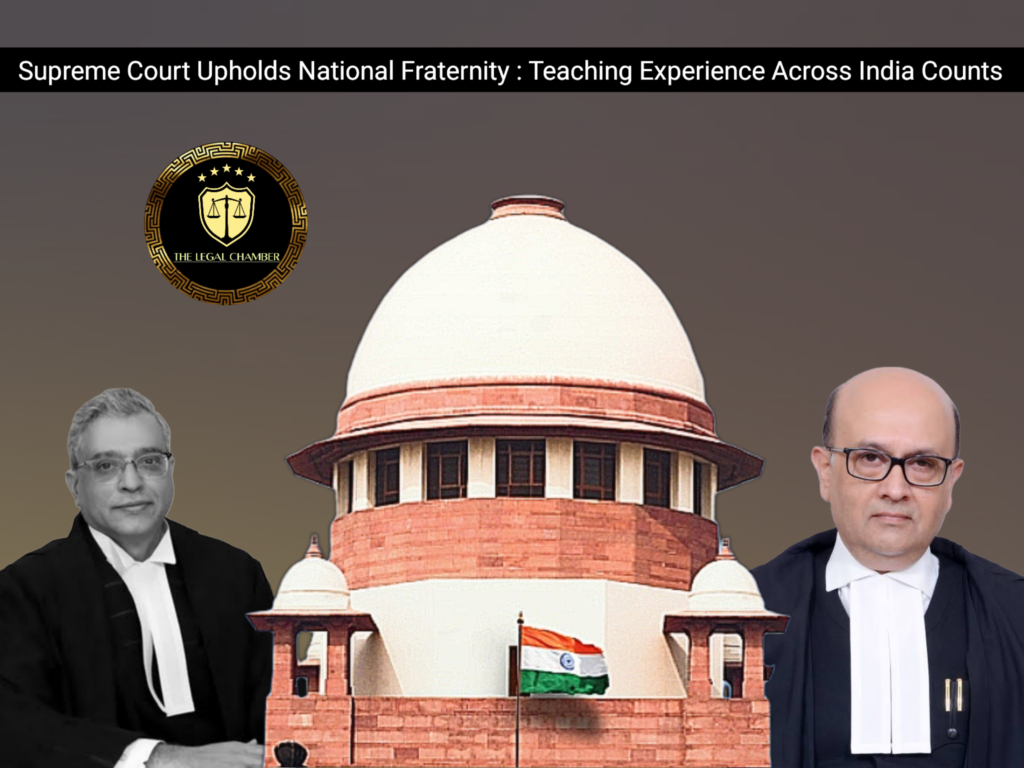
The Supreme Court held that a government notification extending the retirement age must be interpreted purposively, and a condition requiring “10 years of teaching experience in any State-aided university” includes experience from universities outside the state. Excluding such experience was found to be an arbitrary and discriminatory classification violating the right to equality under Article 14.
Facts Of The Case:
The appellant was initially appointed as a teacher in a government college in Assam in 1991, where he served for 16 years. In 2007, he was selected for a non-teaching post at Burdwan University, West Bengal, based on his qualifications and experience, and was later promoted in 2012. In 2021, the State of West Bengal issued a notification increasing the retirement age from 60 to 65 for certain non-teaching staff, provided they had a minimum of 10 years of continuous teaching experience in “any State-aided university or college.” When the appellant sought this benefit, the University and State denied it, asserting that the phrase “any State-aided university” referred only to institutions within West Bengal, thereby excluding his teaching experience from Assam. This led the appellant to file a writ petition. A Single Judge of the Calcutta High Court ruled in his favour, but a Division Bench reversed this decision, interpreting the notification in light of the parent statute which defined key terms restrictively. The appellant then appealed to the Supreme Court against this judgment.
Procedural History:
The appellant filed a writ petition (WPA 16596 of 2023) before the Calcutta High Court challenging the university’s denial of his retirement age extension. A Single Judge allowed the petition, ruling the term “any” in the notification included universities outside West Bengal. The State and University filed separate writ appeals. A Division Bench, via a common order, allowed these appeals and set aside the Single Judge’s judgment, interpreting the notification restrictively in light of the parent statute’s definitions. The appellant then appealed to the Supreme Court through a Special Leave Petition (SLP(C) Diary No. 11923 of 2024), which granted leave and culminated in the present civil appeal. The Supreme Court allowed the appeal, setting aside the Division Bench’s order and restoring the Single Judge’s decision.
READ ALSO :Supreme Court Upholds Life Sentence: Daughter’s Testimony Convicts Father in Wife’s Murder
Court Observation:
The Court observed that the text, context, and objective of the notification revealed its purpose was solely to distinguish between state-aided and private institutions, not to exclude employees with teaching experience from universities outside West Bengal. It held that classifying employees based on the geographical location of their past teaching experience was an artificial, arbitrary, and discriminatory distinction that violated the equality clause under Article 14 of the Constitution. The Court further emphasized that such parochial executive decisions have the potential to undermine fraternity and that constitutional courts must be vigilant in identifying and setting them aside.
Final Decision & Judgement:
The Supreme Court allowed the appeal, set aside the impugned judgment of the Division Bench of the Calcutta High Court, and declared that the appellant is entitled to the benefit of the notification dated 24.02.2021, extending his retirement age to 65 years. The Court held that the condition of “10 years of teaching experience in any State-aided university” includes experience from universities outside West Bengal, and denying the appellant this benefit was arbitrary and violative of Article 14. The appellant was awarded costs quantified at ₹50,000.
Case Details:
Case Title: Subha Prasad Nandi Majumdar vs. The State of West Bengal Service & Ors. Citation: 2025 INSC 910 Appeal Number: SLP(C) Diary No. 11923 of 2024] Date of Judgement: July 30, 2025 Judges/Justice Name: Justice Pamidighantam Sri Narasimha and Justice Manoj Misra
Download The Judgement Here